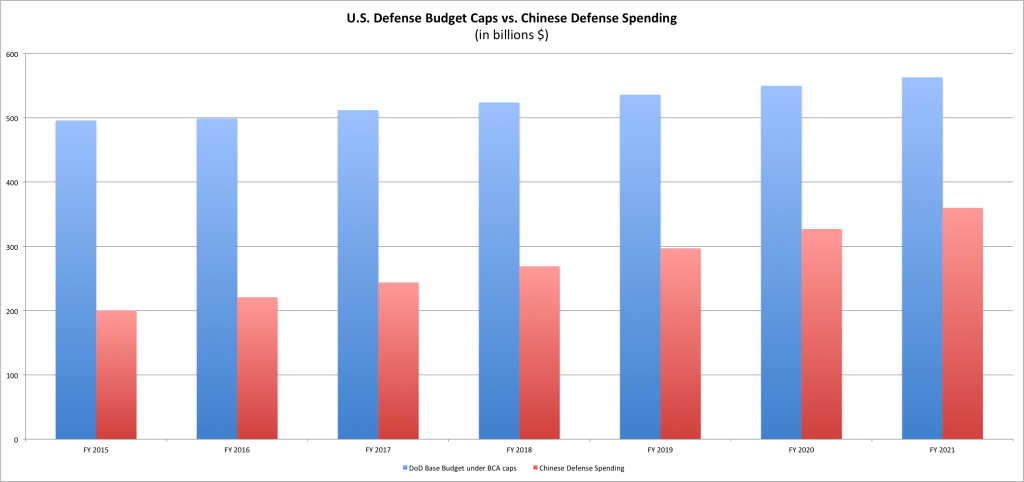The Washington Post has some useful charts putting U.S. defense spending in perspective. Using data from the latest edition of the Military Balance, an annual publication of the International Institute for Strategic Studies (IISS), the Post demonstrates just how far ahead of potential competitors the United States remains.
According to IISS figures, the United States spent $581 billion in 2014. The next fourteen countries—of which 10 are U.S. allies—spent $687 billion on defense. The next biggest spenders behind Washington are China at $129 billion and Saudi Arabia at $81 billion. Russia comes in fourth at $70 billion. As the Post notes, that figure puts Moscow ahead of any of its potential European competitors, which is concerning but also needs to be put into context. The largest European spenders—the United Kingdom, France, Germany, and Italy—are all NATO members. Combined, those countries spent $183 billion, over twice the Russian total. What is more concerning is the perpetually increasing U.S. contribution to NATO spending, which, according to the alliance’s annual report for 2013, increased from 68 to 73 percent beginning in 2007.
For all the panic emanating from some on Capitol Hill, and from across the Potomac at the Pentagon, the United States maintains a large lead in defense expenditures. This fact remains even when the comparisons are skewed heavily in favor of America’s closest potential rival. The IISS estimate cited above for China does not include certain expenditures for internal security or research and development. The Military Balance allows that if these figures are included, the Chinese total increases to $181 billion. The chart below takes the average annual growth rate in Chinese military spending over the past three years and applies it to that figure. When compared to U.S. defense spending under Budget Control Act spending limits, it demonstrates that, while the U.S. lead narrows, it remains substantial into the next decade. Moreover, the chart is even more heavily weighted to the Chinese because the U.S. spending figure only reflects the Pentagon’s base budget under the spending caps. It does not include spending on overseas contingency operations, exempt as it is from the BCA limits, or defense-related spending in organizations such as the Department of Energy or Department of Homeland Security.
But, as far as military effectiveness is concerned, spending only tells part of the story. There are numerous reasons to doubt the Department of Defense is spending American tax dollars either efficiently or wisely. A number of experts recently testified to the House Armed Services Committee concerning the areas in which Pentagon acquisition decisions are increasing the cost of defense to very little practical effect.
Despite what Tom Friedman might think of Beijing’s competence, it would be a mistake to assume that the Chinese are investing their defense dollars any more wisely. A new report from the RAND Corporation argues that, despite substantial financial investments, the People’s Liberation Army “suffers from potentially serious weaknesses.” The report cites two categories of weaknesses that will prevent the People’s Liberation Army from conducting the type of operations “Chinese military strategists see as required to fight and win future wars.” The first category includes institutional problems such as “outdated command structures, quality of personnel, professionalism, and corruption.” The second includes problems with capabilities such as shortcomings in logistics, airlift capabilities, air defense, and antisubmarine warfare.
Russia also faced a number of internal struggles to modernize its military forces even before its most recent economic woes. Given they will still retain sizable militaries, the United States cannot ignore either China or Russia. But the U.S. military maintains a significant lead over either potential rival. That lead is likely to remain in place for the foreseeable future. The Pentagon should take advantage of that fact to put its own house in order, so it will be better prepared when challenges do arise.
